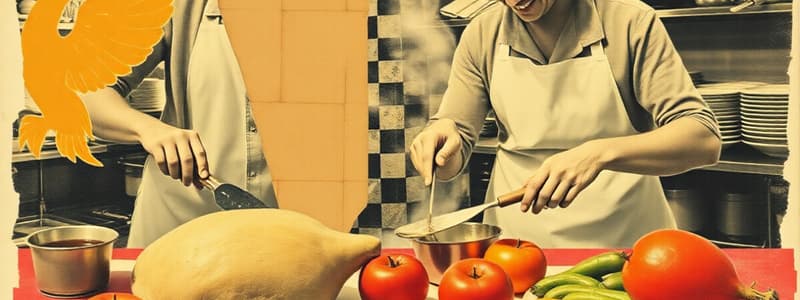Podcast
Questions and Answers
Grilling involves cooking food by using dry heat applied from above or below the food.
Grilling involves cooking food by using dry heat applied from above or below the food.
True (A)
Mincing refers to cutting ingredients into very large pieces.
Mincing refers to cutting ingredients into very large pieces.
False (B)
Boiling involves heating a liquid until bubbles form on the surface.
Boiling involves heating a liquid until bubbles form on the surface.
True (A)
Drizzling is the process of pouring a thick liquid stream over food.
Drizzling is the process of pouring a thick liquid stream over food.
Simmering cooks food at a temperature just below boiling.
Simmering cooks food at a temperature just below boiling.
Baking primarily uses moist heat to cook food.
Baking primarily uses moist heat to cook food.
Garnishing enhances a dish's appearance and flavor.
Garnishing enhances a dish's appearance and flavor.
Chopping implies cutting food into long, thin strips.
Chopping implies cutting food into long, thin strips.
Braising involves only wet heat cooking techniques.
Braising involves only wet heat cooking techniques.
Roasting creates hot air to cook food evenly on all sides.
Roasting creates hot air to cook food evenly on all sides.
Blanching is used to enhance the bitterness of vegetables.
Blanching is used to enhance the bitterness of vegetables.
It is safe to cook with loose clothing as it does not pose any danger.
It is safe to cook with loose clothing as it does not pose any danger.
Poaching involves submerging food in a liquid at high temperatures.
Poaching involves submerging food in a liquid at high temperatures.
Always storing knives in a wooden block helps keep them out of children's reach.
Always storing knives in a wooden block helps keep them out of children's reach.
It is advisable to turn pot handles towards the front of the stove for easy access.
It is advisable to turn pot handles towards the front of the stove for easy access.
Wearing dangling jewelry can be safe while cooking.
Wearing dangling jewelry can be safe while cooking.
Flashcards
Baking
Baking
Cooking food using dry heat, usually in an oven.
Batter
Batter
A liquid mixture of flour and other ingredients, used for cooking.
Boil
Boil
Heating a liquid until bubbles consistently form on the surface.
Chop
Chop
Signup and view all the flashcards
Cube
Cube
Signup and view all the flashcards
Drizzle
Drizzle
Signup and view all the flashcards
Marinate
Marinate
Signup and view all the flashcards
Simmer
Simmer
Signup and view all the flashcards
Toss
Toss
Signup and view all the flashcards
Roasting
Roasting
Signup and view all the flashcards
Braising
Braising
Signup and view all the flashcards
Poaching
Poaching
Signup and view all the flashcards
Blanching
Blanching
Signup and view all the flashcards
Knife Safety
Knife Safety
Signup and view all the flashcards
Cooking Safety
Cooking Safety
Signup and view all the flashcards
Kitchen Fire Safety
Kitchen Fire Safety
Signup and view all the flashcards
Study Notes
EPP 5 - LESSON 10: PREPARING AND COOKING MEALS
- Learning to cook at home is economical and healthier.
- Cooking involves specific methods to achieve perfect flavor.
- Mastering cooking methods improves recipes.
DIFFERENT METHODS OF PREPARING FOODS
- Methods & Definitions
- Bake: Cooking food through dry heat, usually in an oven.
- Batter: Liquid mixture of flour and ground/soaked grains.
- Beat: Mixing food thoroughly until smooth.
- Boil: Heating liquid until bubbles appear on the surface.
- Chop: Cutting food into small pieces.
- Cube: Cutting food into squares (½ - 2 inches).
- Drizzle: Pouring liquid in a thin stream (e.g., melted butter, sugar).
- Garnish: Decorating food for appearance and flavor.
- Grate: Rubbing food (e.g., cheese, vegetables) against a grater.
- Grill: Cooking with dry heat, often from above or below.
- Marinate: Soaking food in a liquid mixture to add flavor.
- Mince: Cutting ingredients into extremely fine pieces.
- Pare: Cutting off the outer covering of ingredients.
- Peel: Removing the outer covering of ingredients.
- Simmer: Cooking gently just below boiling point.
- Slice: Cutting evenly, usually across the grain.
- Stir: Moving food with a spoon in a circular motion.
- Toss: Combining ingredients gently, often for salads.
- Roasting: Dry heat cooking using indirect heat (flame/oven).
- Braising: Cooking using both dry and wet heat; searing in pan, then slow cooking.
- Poaching: Submerging food in liquid at lower temperatures.
- Blanching: Preserving color, flavor, and nutrients of foods (remove bitterness).
SAFETY TIPS IN COOKING
- General kitchen safety:
- Store knives safely, wash hands properly, keep hair restrained.
- Avoiding accidents:
- Pay attention, avoid loose clothing and jewelry.
- Secure potential hazards (knives, dangling items, hot pots.
- Use potholders, keep pot handles away from the stove.
- Keep raw meat, fish, and dairy separate.
- Avoid cross-contamination in the kitchen.
- Important kitchen safety rules:
- Do not cook if wearing loose clothing or jewelry.
- Always pay attention and follow procedures.
- Handle food safely.
- Clean up immediately.
- Keep work area clean and dry
- Temperature-sensitive items: keep raw meat, fish, dairy cold.
Studying That Suits You
Use AI to generate personalized quizzes and flashcards to suit your learning preferences.




